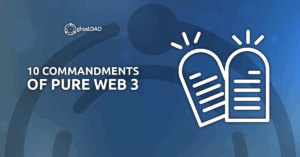Are You a GHOST?
Maybe you’ve never heard of GHOST – or maybe you’ve been in crypto for years but still feel something’s off.
Bitcoin promised freedom. Ethereum promised decentralization. But look where we are now:
- Central banks co-opting crypto for CBDCs.
- Exchanges begging regulators for approval.
- “Web3” projects storing your keys, enforcing KYC, and bending the knee to the very systems crypto was meant to escape.
It’s schizophrenic. A revolution… that’s asking permission?
But not all projects sold out. A rare few still fight for real decentralization – no compromises, no backdoors, no institutional handshakes.
Are you one of us?
This test isn’t about shilling a coin. It’s about answering one question:
Do you still believe crypto can be uncensorable, private, and truly free… OR have you accepted the watered-down corporate version?
If the former… you might be a GHOST.
GHOST Test
Every second spent hesitating makes the surveillance state stronger. Prove your allegiance to real privacy – take the GHOST test now.
1. What role should governments play in cryptocurrency?
- Ban or heavily regulate it – it’s too risky.
- Regulate to prevent fraud but allow innovation.
- Minimal interference – let markets decide.
- Crypto should replace state-controlled money entirely.
2. How important are privacy coins or anonymous transactions?
- Dangerous – they enable crime.
- Useful in some cases but need oversight.
- Essential for personal freedom.
- Critical for resisting financial surveillance.
3. Where do you store most of your wealth?
- Banks, stocks, and real estate.
- A mix of traditional and crypto assets.
- Mostly in crypto (BTC, ETH, DeFi).
- In decentralized, censorship-resistant assets (self-custody, DAOs).
4. How do you approach crypto investments?
- Avoid them – too volatile.
- Only Bitcoin/ETH as a small portfolio hedge.
- Actively trade, stake, and use DeFi.
- Invest in disruptive Web3 projects (DeFi, privacy, parallel economies).
5. Should people have sovereign control over their digital identity?
- No, governments/companies should verify identity.
- Some balance between privacy and regulation.
- Yes, decentralized identity (DIDs) is the future.
- Absolute self-sovereignty – no KYC, no tracking.
6. Can crypto truly change the world?
- No, it’s just a speculative asset.
- Maybe in finance, but limited elsewhere.
- Yes – DeFi, DAOs, and uncensorable money matter.
- It’s our best tool to dismantle corrupt systems.
7. How do you view government-issued digital currencies (e.g. CBDC)?
- Good – safer than unregulated crypto.
- Useful if properly regulated.
- Dangerous – they enable surveillance.
- A threat to financial freedom; must be resisted.
8. How do you approach capital allocation?
- Set-and-forget (index funds, long-term holds).
- Balanced portfolio with occasional adjustments.
- Actively seek asymmetric opportunities (early-stage bets).
- Proactively engage with community to make sensible impact.
9. How important is anonymity online?
- Not important – I have nothing to hide.
- Somewhat important for sensitive matters.
- Very important – privacy is eroding.
- Essential; surveillance capitalism must be resisted.
10. Do you feel a personal responsibility to change systems you disagree with?
- No, systems are too big to change.
- Voting and donations are enough.
- Yes, through entrepreneurship or investment.
- Yes, even if it means subverting corrupt structures.
11. Should individuals have full control over their assets without third-party restrictions?
- No, oversight prevents abuse.
- Some restrictions are necessary.
- Yes, absolute ownership is a right.
- Yes, and we should build systems that enforce this.
12. What will dominate global finance in 10 years?
- Traditional banks and fiat.
- A mix of fiat and regulated crypto.
- Decentralized crypto and DeFi.
- Parallel, uncensorable economies outside state control.
How to Submit Your Answers?
Step 1
Register in the ghostAirdrop Bot.
Step 2
Press About

Step 3
Press Ask me Anything

Step 4
Submit your answers


